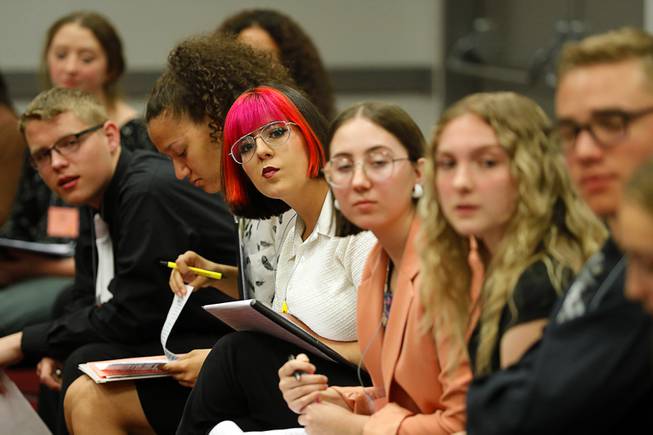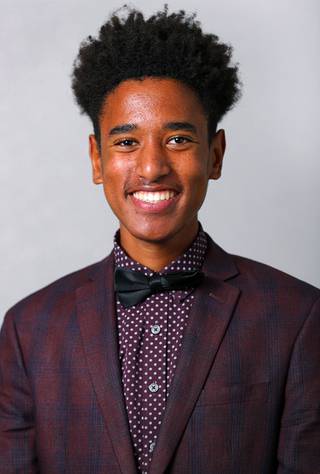
Students listen to a student’s comment during the 2019 Las Vegas Sun Youth Forum at the Las Vegas Convention Center Wednesday, Nov. 13, 2019.
Wednesday, Dec. 25, 2019 | 2 a.m.
View more of the Sun's opinion section
First in a series
Editor’s note:
For 63 years, the Sun Youth Forum has given Las Vegas teens an opportunity to discuss the important issues of their day with their peers from high schools across the valley.
But the event isn’t just for students — it also provides the community a glimpse of how the young people of Las Vegas feel about current events and what improvements they would like to see in their city, their state, their nation and their world.
This year’s version of the forum drew more than 1,000 students from 52 schools to the Las Vegas Convention Center, where they were divided into discussions in seven topic areas — Law and Crime, America, Around the World, School Days, Home in Nevada, Teen Topics and Potpourri. Afterward, a student representative was selected from each group to report to the community about their discussions through local media.
This week, the Sun is presenting a series about the forum based on interviews with student representatives from across the topic areas.
Here’s what we feel the community can learn from this group.
They want action on climate change, and they want it now.
Here’s a message to any climate change denier who thinks he is influencing younger people: OK, boomer.
The topic prompted impassioned discussion during the forum, students said, which led to overwhelming consensus that reducing greenhouse gas emissions was a top priority for this generation.
“The majority of the people in the room spoke out stating that this was a matter that was going to change our way of life, our quality of life — that people are going to die if we do not take climate change seriously and if we don’t ensure a future for our generation and the ones to follow,” said Amelia Norman, a senior at Foothill High School.
Norman said her Around the World group contained one climate change denier who argued that reducing fossil fuels in favor of renewable energy would create more economic damage than global warming would cause. She said other students countered that renewable energy would create new jobs, new wealth and a better quality of life, especially in communities whose primary industries are mining, drilling, etc.
The arguments didn’t sway the climate denier, Norman said, but they drew strong support from the rest of the group.
“We agreed that within the U.S., especially, it was important to return to the goals and ideals of the Paris accords and to slowly phase in renewable energy in order to provide companies with a period of time to adjust and ensure people are receiving jobs in the process,” she said.
Other representatives said their groups contained no outliers on the issue — everyone agreed that global warming needed to be addressed immediately.
That included action on an individual level. Jade Guzman, a senior at Cimarron-Memorial High School, said discussion in her Potpourri group included the importance of vetting products marketed as being green. An example is a company that sells bracelets and purports to invest $1 out of every sale to removing plastic from oceans and beaches.
“But you can’t actually find out where a lot of their revenue is going,” Guzman said. “They aren’t required to release that information, and when pressed by the media, they refuse to respond.
“So you have to be a smart consumer. You want to support causes that are good, but at the same time you don’t really know where your money’s going.”
Liliana Pinto, a Valley High School senior, said the same issue came up in her Potpourri group during a discussion about companies selling reusable water or replacing plastic straws with paper straws.
“It reels in our demographic,” she said. “But we thought, ‘Are they doing this because they care, or are they doing it to grab our attention and get the money out of our pockets.’ ”
Ana Campanico, a senior at Green Valley High, said her Potpourri group also came away realizing the need to scrutinize ads promoting green products. Companies recognize that such products appeal to younger audiences, she said, but often don’t actually produce them in ways that are environmentally and ethically responsible.
“We need to keep these companies in check and hold them accountable for the products they’re bringing out,” she said.
They see inequity in the funding of local schools, and they demand that something be done about it.
By design, the groups at the Sun Youth Forum feature a mix of students from several high schools — kids who might rarely, if ever, interact with one another. As such, a common experience for participants, especially those in particularly high- or low-income areas of the community, is to discover significant imbalances in how their schools are funded and how that affects the quality of education.
“It became very clear very quickly that some schools have a lot more resources than others,” said Wyatt Layland, a senior at Advanced Technology Academy and a student representative in the Home In Nevada topic. “It was just so obvious. There were kids describing classrooms where they had textbooks that were falling apart and had computers that weren’t working. Then you have people like me who go to a magnet school that has a lot of funding. We’ve never had to deal with those issues.”
In 2019, the Nevada Legislature took the long-overdue step of updating the state’s K-12 education funding formula, which had been in place since the 1960s. The new weighted formula is designed to help address the inequities between schools by providing a relatively larger amount of funding to schools serving populations of students needing specialized services, such as English-language learning and special education.
But students said they had yet to see the changes. They said it was critical for state and district leaders to flow more money into low-income schools.
“We had some people who had really personal experience with it,” said Spencer Dee, a Spring Valley High School senior, of his School Days group. “They said when they went to one school, they were given iPads, but when they went to another school, they didn’t have any. They didn’t have enough textbooks, even, to complete their course.
“That was really heartbreaking for us, especially since there are some of us who do have those luxuries and are taking them for granted.”
They feel schools should help prepare them for life, not just for college.
“One thing we were very negative about was how education is preparing us for the future and our lives in general,” Campanico said. “At our school, we got rid of the home economics class. That’s something I wanted to take, even though it wasn’t going to generate the most weight in my GPA. I wanted to take it to prepare for my life in general — how to do finances and to actually have a house that is functioning.”
Other representatives echoed Campanico’s sentiments about bringing back home ec, and also supported coursework in civics, personal finance and other life skills.
Students also strongly supported changes in sexual and reproductive education, including offering more information on same-gender sexual issues. Some believed the Clark County School District should adopt an abstinence-only policy at the junior high level and save comprehensive sex education for students’ sophomore or junior years.
“I shared with my group that in sixth or seventh grade, I had a friend get pregnant, and we talked about that,” said Andres Carrasco, a Spring Valley High School senior. “We came to a consensus that abstinence should be practiced in middle school. But in high school, we need a more realistic approach.”

